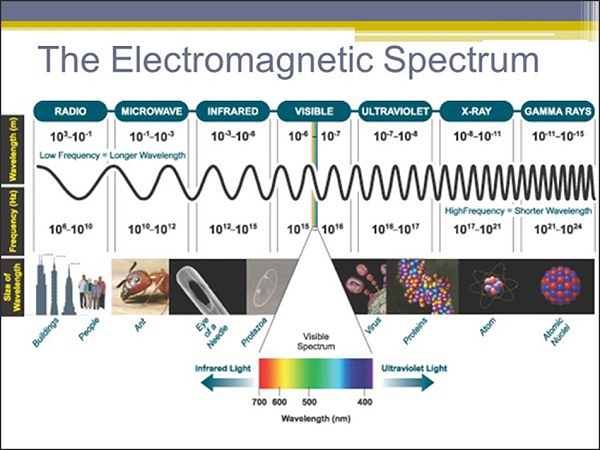Electromagnetic Spectrum consists of entire range of electromagnetic radiation. Radiation is the energy that travels and spreads out as it propagates. The types of electromagnetic radiation that makes the electromagnetic spectrum is depicted in the following screenshot.

Let us now take a look at the properties of Microwaves.
Properties of Microwaves
Following are the main properties of Microwaves.
-
Microwaves are the waves that radiate electromagnetic energy with shorter wavelength.
-
Microwaves are not reflected by Ionosphere.
-
Microwaves travel in a straight line and are reflected by the conducting surfaces.
-
Microwaves are easily attenuated within shorter distances.
-
Microwave currents can flow through a thin layer of a cable.
Advantages of Microwaves
There are many advantages of Microwaves such as the following −
-
Supports larger bandwidth and hence more information is transmitted. For this reason, microwaves are used for point-to-point communications.
-
More antenna gain is possible.
-
Higher data rates are transmitted as the bandwidth is more.
-
Antenna size gets reduced, as the frequencies are higher.
-
Low power consumption as the signals are of higher frequencies.
-
Effect of fading gets reduced by using line of sight propagation.
-
Provides effective reflection area in the radar systems.
-
Satellite and terrestrial communications with high capacities are possible.
-
Low-cost miniature microwave components can be developed.
-
Effective spectrum usage with wide variety of applications in all available frequency ranges of operation.
Disadvantages of Microwaves
There are a few disadvantages of Microwaves such as the following −
- Cost of equipment or installation cost is high.
- They are hefty and occupy more space.
- Electromagnetic interference may occur.
- Variations in dielectric properties with temperatures may occur.
- Inherent inefficiency of electric power.
Applications of Microwaves
There are a wide variety of applications for Microwaves, which are not possible for other radiations. They are −
Wireless Communications
- For long distance telephone calls
- Bluetooth
- WIMAX operations
- Outdoor broadcasting transmissions
- Broadcast auxiliary services
- Remote pickup unit
- Studio/transmitter link
- Direct Broadcast Satellite (DBS)
- Personal Communication Systems (PCSs)
- Wireless Local Area Networks (WLANs)
- Cellular Video (CV) systems
- Automobile collision avoidance system
Electronics
- Fast jitter-free switches
- Phase shifters
- HF generation
- Tuning elements
- ECM/ECCM (Electronic Counter Measure) systems
- Spread spectrum systems
Commercial Uses
- Burglar alarms
- Garage door openers
- Police speed detectors
- Identification by non-contact methods
- Cell phones, pagers, wireless LANs
- Satellite television, XM radio
- Motion detectors
- Remote sensing
Navigation
- Global navigation satellite systems
- Global Positioning System (GPS)
Military and Radar
-
Radars to detect the range and speed of the target.
-
SONAR applications
-
Air traffic control
-
Weather forecasting
-
Navigation of ships
-
Minesweeping applications
-
Speed limit enforcement
-
Military uses microwave frequencies for communications and for the above mentioned applications.
Research Applications
- Atomic resonances
- Nuclear resonances
Radio Astronomy
- Mark cosmic microwave background radiation
- Detection of powerful waves in the universe
- Detection of many radiations in the universe and earth’s atmosphere
Food Industry
- Microwave ovens used for reheating and cooking
- Food processing applications
- Pre-heating applications
- Pre-cooking
- Roasting food grains/beans
- Drying potato chips
- Moisture levelling
- Absorbing water molecules
Industrial Uses
- Vulcanizing rubber
- Analytical chemistry applications
- Drying and reaction processes
- Processing ceramics
- Polymer matrix
- Surface modification
- Chemical vapor processing
- Powder processing
- Sterilizing pharmaceuticals
- Chemical synthesis
- Waste remediation
- Power transmission
- Tunnel boring
- Breaking rock/concrete
- Breaking up coal seams
- Curing of cement
- RF Lighting
- Fusion reactors
- Active denial systems
Semiconductor Processing Techniques
- Reactive ion etching
- Chemical vapor deposition
Spectroscopy
- Electron Paramagnetic Resonance (EPR or ESR) Spectroscopy
- To know about unpaired electrons in chemicals
- To know the free radicals in materials
- Electron chemistry
Medical Applications
- Monitoring heartbeat
- Lung water detection
- Tumor detection
- Regional hyperthermia
- Therapeutic applications
- Local heating
- Angioplasty
- Microwave tomography
- Microwave Acoustic imaging
For any wave to propagate, there is the need of a medium. The transmission lines, which are of different types, are used for the propagation of Microwaves. Let us learn about them in the next chapter.
Learning working make money